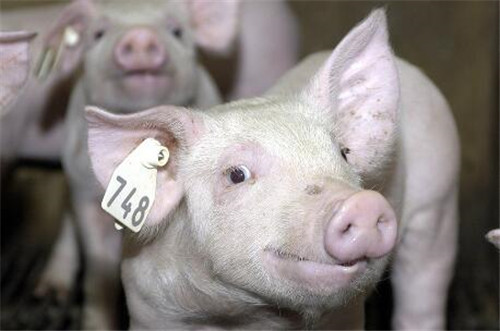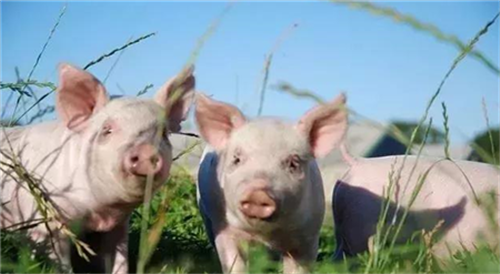What if piglets always have diarrhea? The key is to find the right cause. Don't treat it blindly.
Diarrhea in weaned piglets is a very common problem in the process of raising pigs. There are many causes of diarrhea in pigs, such as cold and heat in piglets, improper feeding, poor digestion, sow milk, diarrhea caused by bacteria and parasites, and so on. The means of treatment for diarrhea caused by different causes are also different. Therefore, when diarrhea occurs in piglets, we should first find out the cause, and then treat the disease according to the cause.
1. Piglets have poor digestive function.
The immunity of the piglets themselves is relatively weak, and the intestinal flora is not very stable. If the milk of sows is too much or too thick, or the feed ratio is not suitable, it is easy to cause diarrhea caused by indigestion in piglets. In view of this situation, the problem of piglet diarrhea can be solved by balancing the microflora in the gastrointestinal tract of piglets and increasing the content and activity of digestive enzymes.
Measures: generally, a certain amount of whey powder can be added to the feed, or a certain amount of organic acids and probiotics can be added to drinking water, which can effectively prevent piglet diarrhea. All of them can promote the growth and reproduction of lactic acid bacteria and other beneficial bacteria in the gastrointestinal tract, inhibit the growth of harmful bacteria, and maintain the balance of microorganisms in the intestinal tract.
two。 Nutritional diarrhea caused by improper feeding
In the process of feeding piglets, the nutrition and ratio of feed are very important. Excessive nutrition can easily lead to diarrhea, such as high protein content in feed; undernutrition can also lead to diarrhea, such as lack of iron and zinc in feed.
Measures: for diarrhea caused by high protein content in feed, it is necessary to reduce the protein content in feed, such as sweet potato leaves, pumpkin, wheat bran and so on instead of soybean meal. However, attention should be paid to the supplement of corresponding amino acids while reducing the protein content in the feed, which can not only prevent and alleviate diarrhea of piglets, but also will not affect the growth and development of piglets.
For diarrhea caused by iron deficiency or zinc deficiency in piglets, it should be replenished in time in the process of feeding. Generally, piglets can supplement iron 3 days after birth, usually by injecting iron dextran (iron dextran or iron-cobalt injection), or laying some red soil or sand mud in the pigsty to allow pigs to arch food freely and get iron from the soil. As for zinc deficiency, some zinc preparations can be added to the feed, such as zinc lactate, zinc gluconate, zinc oxide, zinc sulfate and so on.

In addition to the above problems, in the feeding process may also lead to diarrhea due to hypoglycemia, when the need to supplement glucose, can be injected directly, can also be mixed in drinking water to arch pigs to drink.
3. Bacterial infection
Diarrhea caused by bacterial infection can be divided into two types: early onset (pig yellow dysentery) and late onset (pig white dysentery). Different methods should be taken according to different types of treatment.
Measures: the onset of pig yellow dysentery is relatively early, generally within a few hours or 5 days after birth, the disease may occur, and the condition is more urgent, the mortality rate is higher. For this kind of acute diarrhea, first of all, the sick pigs should be isolated to avoid infection; secondly, through drug treatment, antibiotics can be used on the basis of injecting serum.
The onset of pig white dysentery is relatively late, generally ten days after the birth of piglets, the mortality rate is not very high. This disease is mainly treated with antibiotics and liquid salt is supplemented to prevent dehydration, electrolyte disorder and acidosis. 2% glucose rehydration salt can be selected and added to the water of 100ml for free drinking of pigs.
4. Parasite infection
Diarrhea caused by parasites is mainly caused by coccidia and worms, which usually occurs about half a month after the birth of piglets, and can cause some complications, such as alternating diarrhea and constipation or elevated body temperature. This will seriously affect the growth and development of piglets, and even cause piglets to collapse and die or become stiff pigs.
Measures: in view of this situation, the first thing to do is to deworming, the commonly used anthelmintic drugs are sulfonamides, Lasamycin, Amproline, monensin and so on. Usually, we should also do a good job of deworming, regularly deworming piglets. There is to pay attention to the hygiene of pig houses, pig feces may also carry parasites, eggs, larvae or oocysts, which should also be killed to avoid piglet infection.
5. Piglets are heated and cold
In winter, when the weather is cold, cold piglets can cause gastrointestinal disorders, allowing E. coli to multiply in large numbers, which can lead to diarrhea. In summer, the weather is hot, and if piglets don't drink enough water, it will also cause E. coli to multiply in large numbers, eventually causing diarrhea.
Measures: diarrhea caused by cold in piglets is generally realized as a rise in body temperature and white feces. If it is an unweaned pig, you can feed the sow probiotics and pulsatilla powder and treat diarrhea through the milk of the sow; diarrhea caused by insufficient drinking water generally turns into yellow feces, which is very fishy. Prevention and treatment can be carried out by feeding sows with probiotics and Huanglian jiedu powder, or by giving piglets directly berberine.
6. The problem of sows
Diarrhea in piglets is also partly due to sows, especially unweaned piglets, which need to feed on sow milk to get nutrients. If the sow itself has some problems, such as virus and disease, it will be transmitted to the piglets through milk.
Measures: whether the sows are too fat and nutritious leading to high milk concentration, or poor appetite and poor body condition of sows lead to dilute milk, it will cause indigestion and diarrhea in piglets. In addition, if the sow suffers from mastitis, which carries disease-causing bacteria on the nipples, it can also cause diarrhea in piglets. Therefore, in order to prevent piglet diarrhea, we should also pay attention to sow feeding and disease prevention.
Generally speaking, piglet diarrhea may be the result of a variety of causes, so it can not be treated alone and needs comprehensive treatment. However, preventive work can be done well in advance, such as strengthening the feeding and management of sows at ordinary times, doing a good job in epidemic prevention of sows, creating a good living environment for piglets, keeping clean and sanitary, and regularly disinfecting them, and strengthening the feeding and management of piglets, especially in the three critical periods of birth, feeding and weaning.
It is important to pay attention to this: no matter what causes diarrhea? No matter what the treatment is? At the same time of treatment, we must pay attention to rehydration to avoid causing dehydration of piglets, which can improve the cure probability of piglets and reduce the death caused by diarrhea.
- Prev

What are the trace elements harmful to pigs? What is the performance after poisoning?
What are the trace elements harmful to pigs? What is the performance after poisoning?
- Next

Although the mold is small, it makes thousands of pig farmers want to cry without tears!
Although the mold is small, it makes thousands of pig farmers want to cry without tears!
Related
- On the eggshell is a badge full of pride. British Poultry Egg Market and Consumer observation
- British study: 72% of Britons are willing to buy native eggs raised by insects
- Guidelines for friendly egg production revised the increase of space in chicken sheds can not be forced to change feathers and lay eggs.
- Risk of delay in customs clearance Australia suspends lobster exports to China
- Pig semen-the Vector of virus Transmission (4)
- Pig semen-the Vector of virus Transmission (3)
- Five common causes of difficult control of classical swine fever in clinic and their countermeasures
- Foot-and-mouth disease is the most effective way to prevent it!
- PED is the number one killer of piglets and has to be guarded against in autumn and winter.
- What is "yellow fat pig"? Have you ever heard the pig collector talk about "yellow fat pig"?

